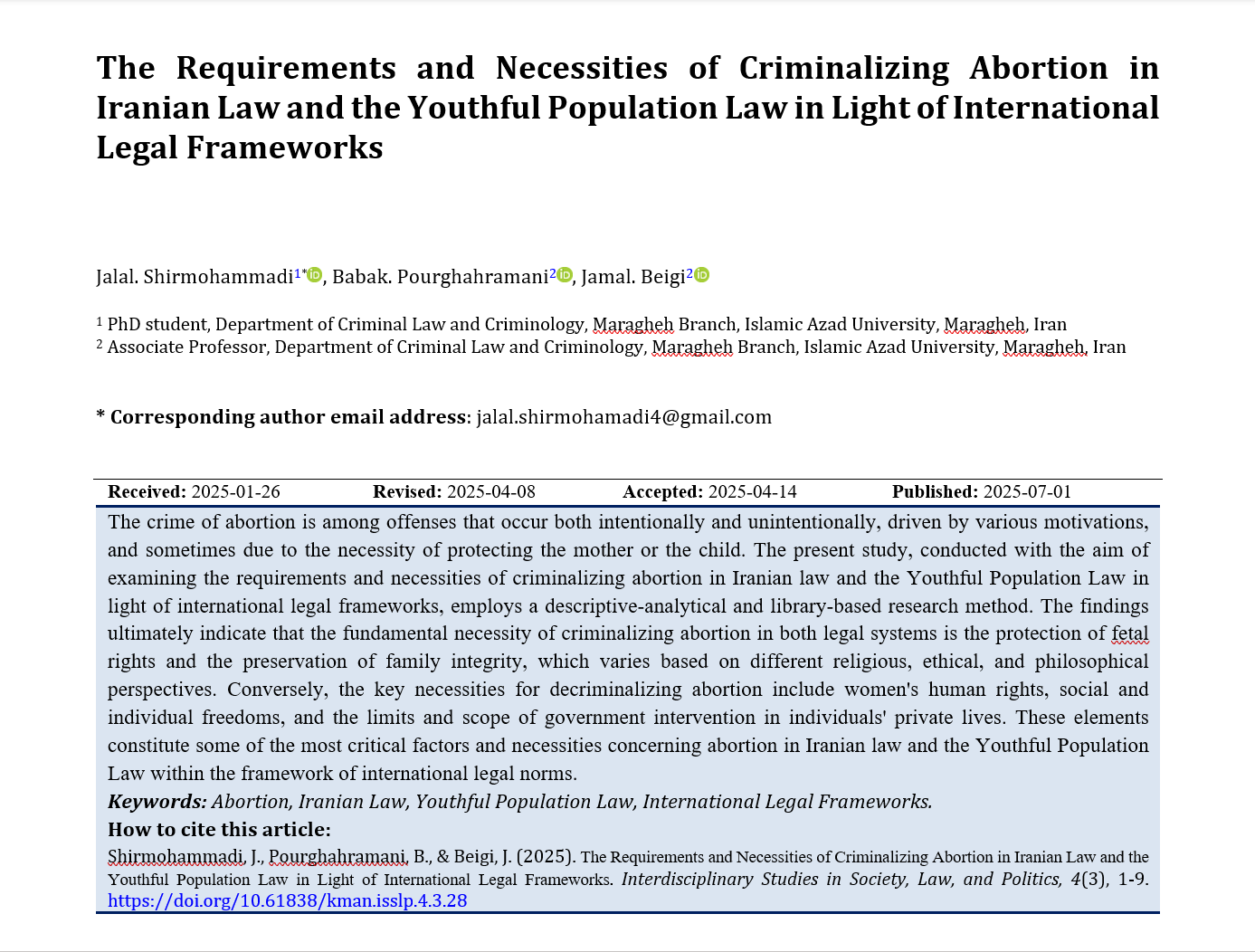The Requirements and Necessities of Criminalizing Abortion in Iranian Law and the Youthful Population Law in Light of International Legal Frameworks
Keywords:
Abortion, Iranian Law, Youthful Population Law, International Legal Frameworks.Abstract
The crime of abortion is among offenses that occur both intentionally and unintentionally, driven by various motivations, and sometimes due to the necessity of protecting the mother or the child. The present study, conducted with the aim of examining the requirements and necessities of criminalizing abortion in Iranian law and the Youthful Population Law in light of international legal frameworks, employs a descriptive-analytical and library-based research method. The findings ultimately indicate that the fundamental necessity of criminalizing abortion in both legal systems is the protection of fetal rights and the preservation of family integrity, which varies based on different religious, ethical, and philosophical perspectives. Conversely, the key necessities for decriminalizing abortion include women's human rights, social and individual freedoms, and the limits and scope of government intervention in individuals' private lives. These elements constitute some of the most critical factors and necessities concerning abortion in Iranian law and the Youthful Population Law within the framework of international legal norms.
Downloads
References
Ahmadi, A., & Saladin Sheikh, R. (2017). Examining abortion in the laws of Iran and Canada. In International Conference on Law, Political Science, and Religious Studies,
Fallah Nejad, F. (2017). Abortion from the perspective of Shiite jurisprudence and Iranian criminal law compared to Japanese criminal law. Women's Research Journal, 8(2).
Hosseini Mohammadi Abad, M. (2016). Legal jurisprudential examination of abortion resulting from adultery. Jurisprudence and the History of Civilization, 2(1).
Jabali, M. (2003). Examining and critiquing the permissibility of abortion from the perspective of Imamiyah jurists. Journal of Comparative Law, 4.
Javadi, H. (2020). Criminal liability of physicians arising from changes in abortion regulations in the legal systems of Iran, England, and France. Private and Criminal Law Research, 16(43).
Karami, S. S. (2024). Examining abortion in the screening stage from the perspective of the Family Support and Youth Law and jurisprudential standards. In 16th National Conference on Law, Social Sciences, and Humanities, Psychology, and Counseling,
Khanlarzadeh, S. (2024). Study and examination of adultery and rape against children in the criminal system of Iran and England. 12, 23.
Mehrgan, A. H. (2022). Abortion and human rights in the mirror of international law. Journal of Medical Ethics and Law, 410.
Moghadisi Mohammad, B. (2022). Judicial approach to therapeutic abortion: A look at the regulations of therapeutic abortion in the Family Support and Youth Law. Forensic Medicine, 27(4).
Nozari Fardousieh, M. (2005). Abortion in Islamic law and feminism. Quarterly Journal of Strategic Women Studies, 28(1).
Schabas, W. A. (2015). The European Convention on Human Rights: A Commentary. Oxford: Oxford University Press. https://doi.org/10.1093/law/9780199594061.001.0001
Shahpourjani, S. (2017). Examining the crime of abortion in Iranian law. Lawyar, 2(2).
Shariati Nasab, S. (2022). Abortion due to maternal hardship in the Family Support and Youth Law. Deviations and Social Issues, 2.
Taghavi, S. M. A. (2022). Examining abortion in the youth population law. In Seventh International Conference on Psychology, Educational Sciences, and Child Rights in the Islamic World,

Downloads
Published
Submitted
Revised
Accepted
Issue
Section
License
Copyright (c) 2025 Jalal Shirmohammadi (Author); Babak Pourghahramani (Corresponding author); Jamal Beigi (Author)

This work is licensed under a Creative Commons Attribution-NonCommercial 4.0 International License.





